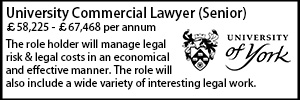Handling novel, contentious and repercussive transactions
- Details
The Department for Education has issued guidance published on novel, contentious and repercussive transactions. Katharine Robinson sets out the key points for colleges and academy trusts.
The Department for Education (DfE) has published good practice guidance for colleges and academy trusts on novel, contentious and repercussive (NCR) transactions. The primary goals of this guidance are to improve the understanding of what constitutes a NCR transaction and to ensure that proper factors are considered and necessary approvals are obtained from the DfE before an academy trust or college enters into a NCR transaction.
The good practice guide helpfully provides illustrative examples of what might constitute an NCR transaction, including running an electric bike scheme, installing floodlights and an all-weather surface on a football field, running a music festival, expenditure on an event overseas for staff members, and selling an asset to raise funds for building repairs.
Key points for colleges and academy trusts:
What is a NCR transaction?
- Novel transactions are those of which the academy trust or college has no experience or are outside its normal course of business. When considering whether a transaction is novel, the academy trust or college needs to consider whether the transaction is novel for them as an individual organisation, rather than the public sector.
- Contentious transactions are those that might cause debate or criticism by Parliament, the public or the media. Academy trusts and colleges will need to think carefully about how a transaction might be perceived as well as the substance of the transaction. Whilst some negative local press might be acceptable, widespread, or national criticism is likely to make a transaction contentious.
- Repercussive transactions are those likely to set a precedent or cause pressure for other academy trusts, colleges, or the wider public sector to take a similar approach and hence have wider financial implications. An illustrative example given in the good practice guidance is an academy trust offering to waive deductions for a strike day as a gesture of goodwill. In the example given, whilst the transaction is well-intentioned (i.e., an attempt to end the dispute with staff), the DfE notes that the impact could be felt throughout the academy sector if other academy trusts felt pressurised to take the same line and that, as such, the transaction would be repercussive.
If an academy trust or college takes the view that a transaction is not NCR, this justification must be documented in case this is ever challenged by the DfE. As part of the decision-making process, the accounting officer should consult their board and give the matter full consideration.
If a transaction could reasonably be considered NCR by someone not involved in the academy trust or college, or even with the sector as a whole, then it must be treated as such, which means approval must be sought from the DfE. Academy trusts and colleges will need to assess these matters objectively. If there is any doubt, the case must be referred to the DfE for a determination, and the DfE's decision will be final.
NCR transactions require prior approval from the DfE
All NCR transactions, regardless of their value, require prior approval from the DfE. The proposed transaction must not be entered into until approval has been given. The good practice guide outlines factors to consider when drafting a request for approval to the DfE.
The DfE will assess each application on its own merits, balancing the potential benefits against potential downsides such as:
- the perception of misuse of public funds;
- high financial risk;
- impropriety;
- poor value for money;
- the reputational risk to the sector as a whole; and
- the overall impact on public finances if a precedent is established.
Compliance and audit considerations
If an academy trust or college discovers they may have made a NCR transaction without prior approval from the DfE, they should approach the DfE to seek retrospective approval. If such a request is refused, the transaction will be classed as a regularity exception that will need to be:
- reported in the accounting officer’s statement of regularity, propriety and compliance within the annual report and accounts; and
- considered by DfE in line with the relevant intervention framework.
Conclusion
It is essential for colleges and academy trusts to familiarise themselves with this guidance to ensure compliance and the proper use of public funds when considering transactions that could be NCR.
Katharine Robinson is a Senior Associate at Stone King.










































